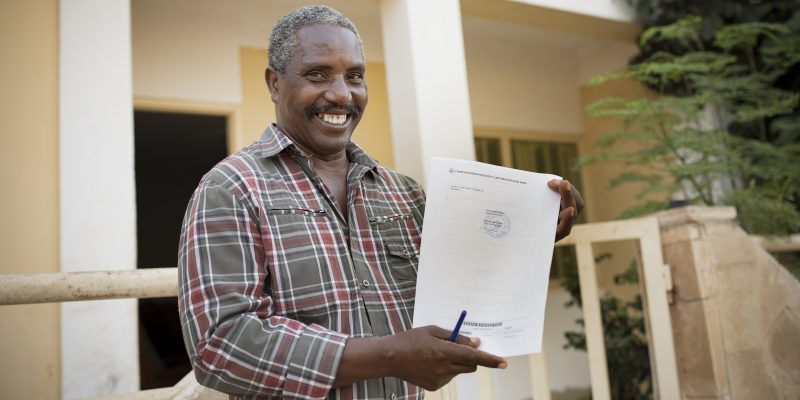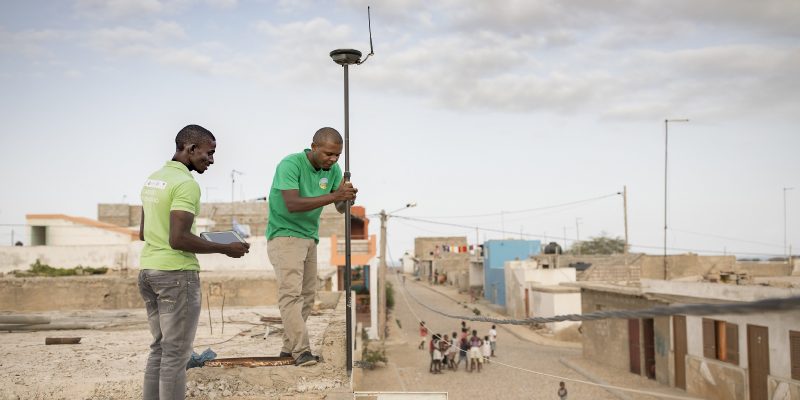In Cabo Verde, tourism comprises as much as 40 percent of gross domestic product. However, a lack of conclusive information about land rights and confusion over ownership has resulted in unauthorized land sales and delays and cancellation of public and private investment projects damaging the growth potential of the island nation. Residents have been wary to use land for income-generating activities like starting a small business, and parents haven’t been able to guarantee that future generations would maintain rights to family property. Land rights registration and transactions have become so time-consuming and costly that it has hampered domestic and foreign investment and economic growth.

Photo credit: Jake Lyell for MCC
Manuel Gomes holds his newly acquired land title outside his home on the island of Maio, Cabo Verde. Mr. Gomes was able to obtain his title as a result of investments made as part of the MCC-Cabo Verde Compact that helped clarify land rights across the island nation.
As part of the MCC-Cabo Verde Compact signed in 2012, MCC supported the Government of Cabo Verde in transforming the land management sector to fight poverty and drive growth. MCC’s compact investment, completed in November 2017, included $17.3 million to help the Government establish a single, reliable source of land rights to facilitate private investment across the islands. More than 600,000 people are estimated to benefit from the agency’s investments over 20 years.
The Government of Cabo Verde took important steps to reform its legal framework for property rights and land administration in 2009, but there were still significant regulatory, institutional and procedural weaknesses in the day-to-day operation of the system. Two different land registries contained only partial information about a limited share of the country’s privately owned land parcels, and separate records systems held information about state-owned land. With no one source containing complete map-based information indicating the actual location of a parcel of land over which a right is claimed, users struggled with unreliable information and time-consuming procedures.
The compact’s Land Management for Investment Project included key legal reforms, established the National Institute for Land Management (INGT) to centralize land registration, and designed and successfully implemented a new land management information and transaction system. The results can be seen on the islands of Boa Vista, Maio, Sal and São Vicente, where a comprehensive survey of land parcels and the compilation of all existing land rights documents were undertaken to produce an accurate land database.

Photo credit: Jake Lyell for MCC
Technicians Ismael Rodrigues (left) and Jose Silva (right) work to survey and geomap a property on the island of Maio as part of the MCC-Cabo Verde Compact. Accurate information about land rights and ownership is important to facilitating private investment in Cabo Verde, where tourism is a major driver of the economy.
Officials in land registry departments who used to handwrite registrations and sift through endless paperwork now deliver registration certificates in days instead of weeks.
“Today, with the new system, we are delivering certificates of registration in three days,” said Maria do Céu Rocha, who has worked at the land registry department in Praia, the country’s capital, for 30 years. Previously, a certificate of registration could take 15 days or more to deliver.
Manuel Gomes, a resident on the island of Maio, lauds the new land registration process.
“I no longer run the risk of losing my property,” he said. “This means my children will have the possibility to build their own home here.”
Real estate investor Arlindo Cardoso has now registered his family’s property and is more confident about approaching other investors about pursuing joint ventures on Maio.
“I have plans to build a small apartment complex and a small resort,” Cardoso said. MCC’s investments are “going to help a lot in the island’s development,” he added.
Following progress on the island of Maio, the Government has committed to complete the rights and boundary clarification process on the remaining islands, with a goal of placing all of the country’s land parcels in the national land register. The project has increased local know-how and expertise in land management, building local capacity and moving the country closer to bringing all of Cabo Verde into the new land management system.
MCC’s approach to land management has helped make Cabo Verde a more welcoming place for investors and opened up new income-generating opportunities for people across the country. As an agency committed to aid effectiveness, MCC continues to explore pay-for-results and other innovative approaches to development that maximize the impact of its investments to help people lift themselves out of poverty.

